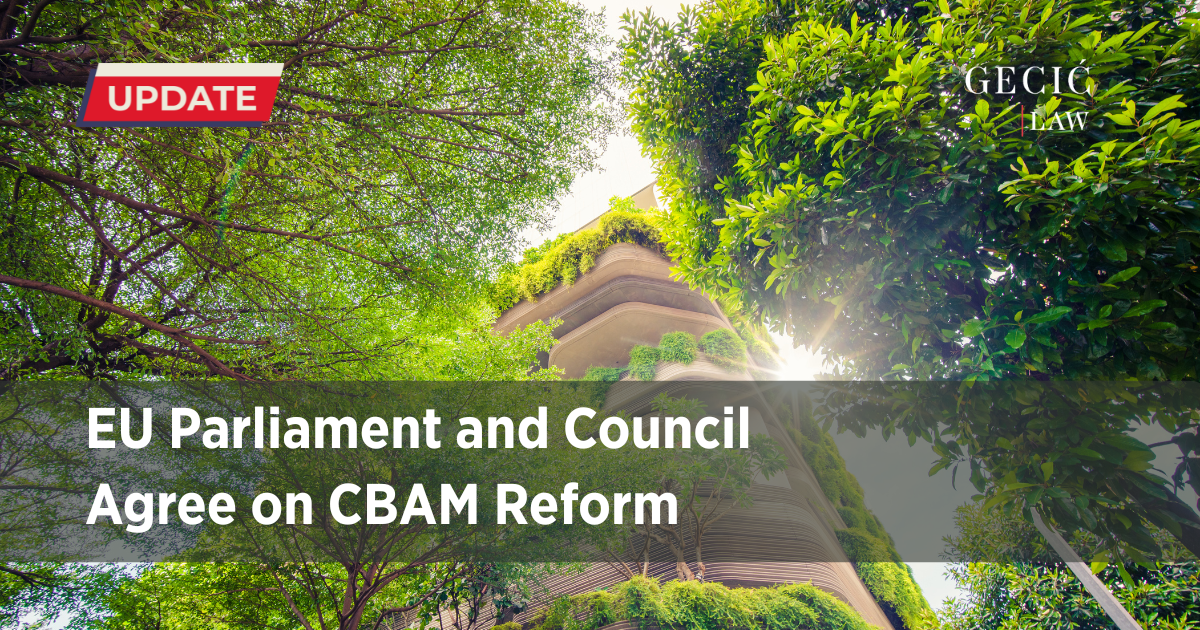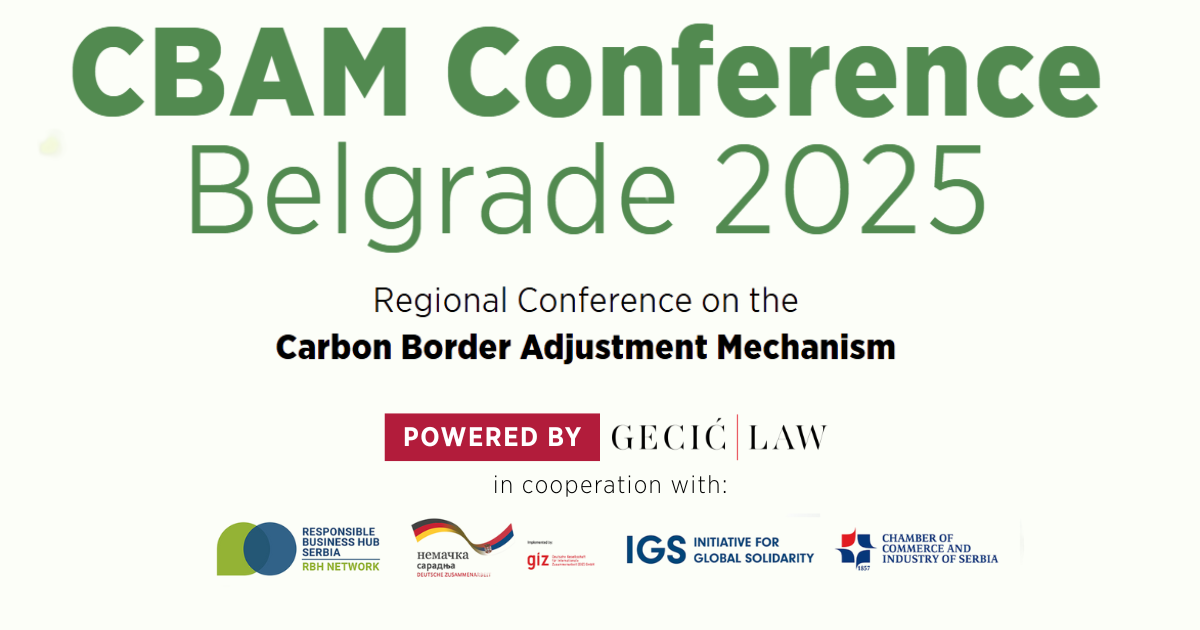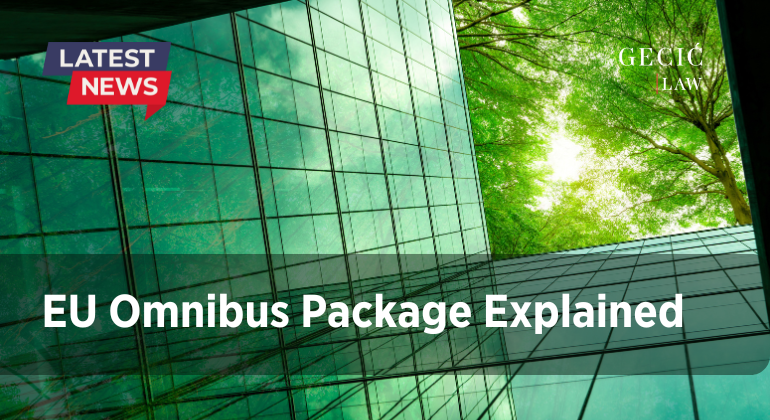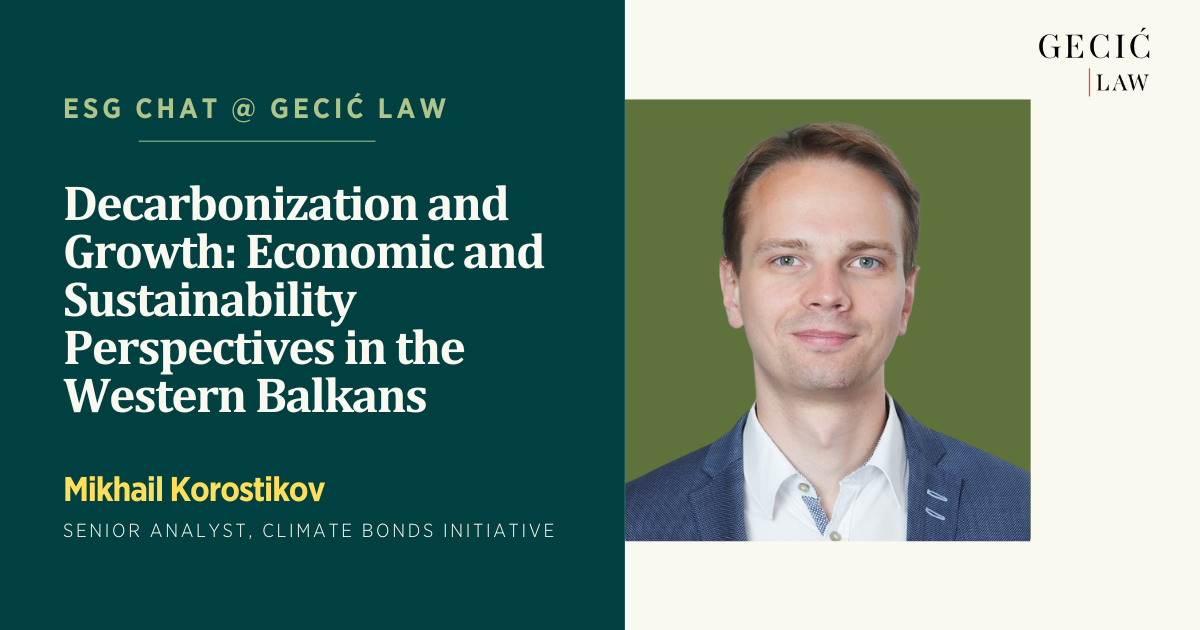


The European Parliament and Council have reached today a provisional agreement to simplify the EU’s Carbon Border Adjustment Mechanism (CBAM). The EU aims to ease administrative burdens while keeping its environmental impact intact. The reform is part of the broader “Omnibus I” legislative package, introduced on 26 February 2025, aimed at making EU laws more business-friendly, especially for small and medium-sized enterprises (SMEs). This reform further aligns with broader EU goals to boost global competitiveness, as outlined in the Commission’s “Competitiveness Compass”, and to reduce administrative burdens by 25% for all companies and 35% for SMEs. A New De Minimis […]
Details

On June 12, 2025, Belgrade will host the Regional Conference on the Carbon Border Adjustment Mechanism (CBAM) – CBAM Belgrade 2025. Powered by Gecić Law, in cooperation with the Responsible Business Hub of the Chamber of Commerce of the Republic of Serbia, GIZ Serbia and the Initiative for Global Solidarity, this unique event brings together policymakers, industry leaders, legal experts, and sustainability professionals to delve into the European Union’s Carbon Border Adjustment Mechanism (CBAM) and its profound implications for the Western Balkans and beyond. Understanding CBAM: A Transformative Climate & Trade Policy The EU’s CBAM regulation aims to level the […]
Details

The European Council has formally adopted its negotiating position on the European Commission’s proposal to amend Regulation (EU) 2023/956, better known as the Carbon Border Adjustment Mechanism (CBAM). This marks a significant step in the EU’s legislative process as the Council prepares to enter interinstitutional negotiations with the European Parliament. The aim is to simplify the CBAM framework, alleviate burdens on importers—especially SMEs—without compromising its climate integrity. The move follows a strong political mandate expressed in key EU strategic documents, such as the Letta and Draghi reports and the Budapest Declaration, calling for a “simplification revolution” across EU legislation. The […]
Details

In a significant step toward balancing environmental ambition with economic practicality, the European Parliament has backed today reforms to streamline the EU’s Carbon Border Adjustment Mechanism (CBAM). The proposals are part of the European Commission’s broader “Omnibus I” simplification package introduced earlier this year, reflecting the EU’s intent to enhance administrative efficiency without compromising its climate targets. The revised rules aim to ease the compliance burden on small and medium-sized enterprises (SMEs) by introducing a de minimis threshold of 50 tonnes. This change would exempt about 90% of importers, particularly smaller and occasional ones, from CBAM obligations—while still covering 99% […]
Details

On May 12, 2025, the Russian Federation formally launched consultations at the World Trade Organization (WTO) against the European Union’s Carbon Border Adjustment Mechanism (CBAM). This concurrently marks the first major legal challenge to CBAM, the EU’s flagship climate-trade instrument. Russia argues that CBAM violates core WTO rules. It claims that the regulation protects EU industries under the guise of climate action. The dispute therefore raises critical questions about the legality of linking trade and climate policy. Russia’s Core Claims Russia calls CBAM a disguised restriction on trade, saying the mechanism burdens non-EU exporters with complex rules and extra costs. […]
Details

The European Parliament’s Committee on International Trade (INTA) gave backing to the European Commission’s plan to simplify the Carbon Border Adjustment Mechanism (CBAM), as part of the Omnibus I legislative package. The vote took place during an extraordinary session on April 23, 2025. A significant majority of MEPs supported the proposal and rejected proposed amendments. What Did INTA Approve? INTA endorsed a set of changes designed to ease the administrative burden of CBAM. These simplifications aim to help businesses comply while preserving the system’s environmental goals. Key proposed changes include: Exemption for Small ImportersImporters handling less than 50 tonnes […]
Details

The European Commission has introduced a new legislative package aimed at simplifying sustainability and investment regulations. In the latest Competitiveness Compass we recently covered, the Commission outlined its strategy to enhance the EU’s economic prosperity and competitiveness. Known as Omnibus I and Omnibus II, these reforms are designed to cut administrative burdens, enhance business competitiveness, and maintain the EU’s commitment to sustainability goals. The key areas affected include the Corporate Sustainability Reporting Directive (CSRD), the Corporate Sustainability Due Diligence Directive (CSDDD), the Carbon Border Adjustment Mechanism (CBAM), and the InvestEU Regulation. By streamlining compliance, the EU hopes to make regulatory […]
Details

The European Union’s Carbon Border Adjustment Mechanism (CBAM) is undergoing a major simplification – and it’s big news for businesses in the Western Balkans and around the world. CBAM, a cornerstone of the EU’s Green Deal, is designed to put a carbon price on imports of carbon-intensive goods. This helps prevent “carbon leakage” – the shift of production (and emissions) to countries with looser climate rules – and protects EU industries from unfair competition. But while the environmental goal is clear, CBAM’s complex rules raised concerns for businesses both inside and outside the EU. Now, recent moves to simplify CBAM’s […]
Details

The European Commission recently launched the consultation phase on two essential draft regulations to strengthen the EU Carbon Border Adjustment Mechanism (CBAM) regulation’s operational structure. These include the draft Implementing Regulation for Authorized Declarants and creating a comprehensive CBAM registry. Stakeholders can submit feedback until November 28, 2024. These regulations clarify key aspects of the definitive CBAM implementation, set to begin on January 1, 2026. Draft Implementing Regulation for Authorized Declarants Starting January 1, 2026, all importers of goods within the CBAM scope must qualify as Authorized CBAM Declarants. This therefore includes importers of cement, iron and steel, aluminum, fertilizers, electricity, […]
Details

The inaugural meeting of the informal Expert Group on the Carbon Border Adjustment Mechanism (CBAM) took place online on April 23, 2024. Hosted by the Directorate-General for Taxation and Customs Union (DG TAXUD), the meeting marked the beginning of a collaborative effort to guide the implementation of CBAM during its transitional phase and the definitive period, which is set to commence on January 1, 2026. The expert group comprises representatives from EU Member States, industry associations, NGOs, civil society, observers from third countries and international organizations. The session began with a welcome from DG TAXUD, acknowledging the participants’ commitment to […]
Details

In a landmark accomplishment, the collaborative efforts of Gecić Law’s ESG and EU Law teams, alongside Shibolet & Co.’s Environment, Sustainability & Climate Change team, in partnership with Sher Consulting & Training, have led to a significant milestone. This achievement marks the successful submission of the first CBAM reports from Israel in accordance with the EU’s new CBAM (Carbon Border Adjustment Mechanism) regulation. This groundbreaking collaboration supports Israeli aluminum, steel, and iron exporters, addressing the challenges of a new era in environmental accountability. Importers successfully submitted their first CBAM reports, covering the fourth quarter of 2023, by the January 31, […]
Details

In latest CBAM news, the European Commission has acknowledged significant technical difficulties impacting businesses for the EU Carbon Border Adjustment Mechanism (CBAM) reporting. These issues stem from a technical malfunction affecting several EU customs systems, including ICS2 and the CBAM Registry. To support declarants facing challenges in CBAM reporting, the Commission has introduced measures to facilitate the process. Starting from February 1, a new feature in the Transitional Registry will allow affected businesses to “request delayed submission”. This provision grants an additional 30 days for submitting their quarterly CBAM report. The Commission has assured that no penalties will apply for […]
Details

Gecić Law is pleased to announce the second edition of “ESG Chat @ Gecić Law,” an insightful series of interviews exploring the dynamic and ever-evolving world of Environmental, Social, and Governance (ESG) practices. Decarbonization and Growth In this edition, we bring you a thought-provoking discussion with Mikhail Korostikov, Senior Analyst at the Climate Bonds Initiative and a leading expert in green economics based in Serbia. The interview delves into the intricate relationship between the issue of sustainability, decarbonization and economic growth. We take a look at these phenomena from the perspective of the Western Balkans. Central to the discussion is […]
Details